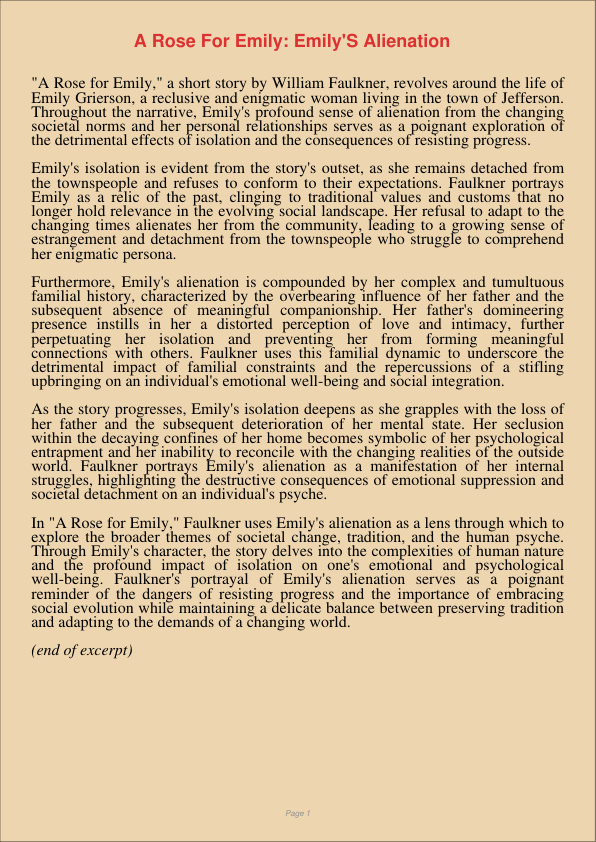A Rose For Emily EmilyS Alienation
Jan 6, 2024
rose
emily
Health Sciences & Medicine
Education
“A Rose for Emily,” a short story by William Faulkner, revolves around the life of Emily Grierson, a reclusive and enigmatic woman living in the town of Jefferson. Throughout the narrative, Emily’s profound sense of alienation from the changing societal norms and her personal relationships serves as a poignant exploration of the detrimental effects of isolation and the consequences of resisting progress.
Emily’s isolation is evident from the story’s outset, as she remains detached from the townspeople and refuses to conform to their expectations. Faulkner portrays Emily as a relic of the past, clinging to traditional values and customs that no longer hold relevance in the evolving social landscape. Her refusal to adapt to the changing times alienates her from the community, leading to a growing sense of estrangement and detachment from the townspeople who struggle to comprehend her enigmatic persona.
Furthermore, Emily’s alienation is compounded by her complex and tumultuous familial history, characterized by the overbearing influence of her father and the subsequent absence of meaningful companionship. Her father’s domineering presence instills in her a distorted perception of love and intimacy, further perpetuating her isolation and preventing her from forming meaningful connections with others. Faulkner uses this familial dynamic to underscore the detrimental impact of familial constraints and the repercussions of a stifling upbringing on an individual’s emotional well-being and social integration.
As the story progresses, Emily’s isolation deepens as she grapples with the loss of her father and the subsequent deterioration of her mental state. Her seclusion within the decaying confines of her home becomes symbolic of her psychological entrapment and her inability to reconcile with the changing realities of the outside world. Faulkner portrays Emily’s alienation as a manifestation of her internal struggles, highlighting the destructive consequences of emotional suppression and societal detachment on an individual’s psyche.
In “A Rose for Emily,” Faulkner uses Emily’s alienation as a lens through which to explore the broader themes of societal change, tradition, and the human psyche. Through Emily’s character, the story delves into the complexities of human nature and the profound impact of isolation on one’s emotional and psychological well-being. Faulkner’s portrayal of Emily’s alienation serves as a poignant reminder of the dangers of resisting progress and the importance of embracing social evolution while maintaining a delicate balance between preserving tradition and adapting to the demands of a changing world.
